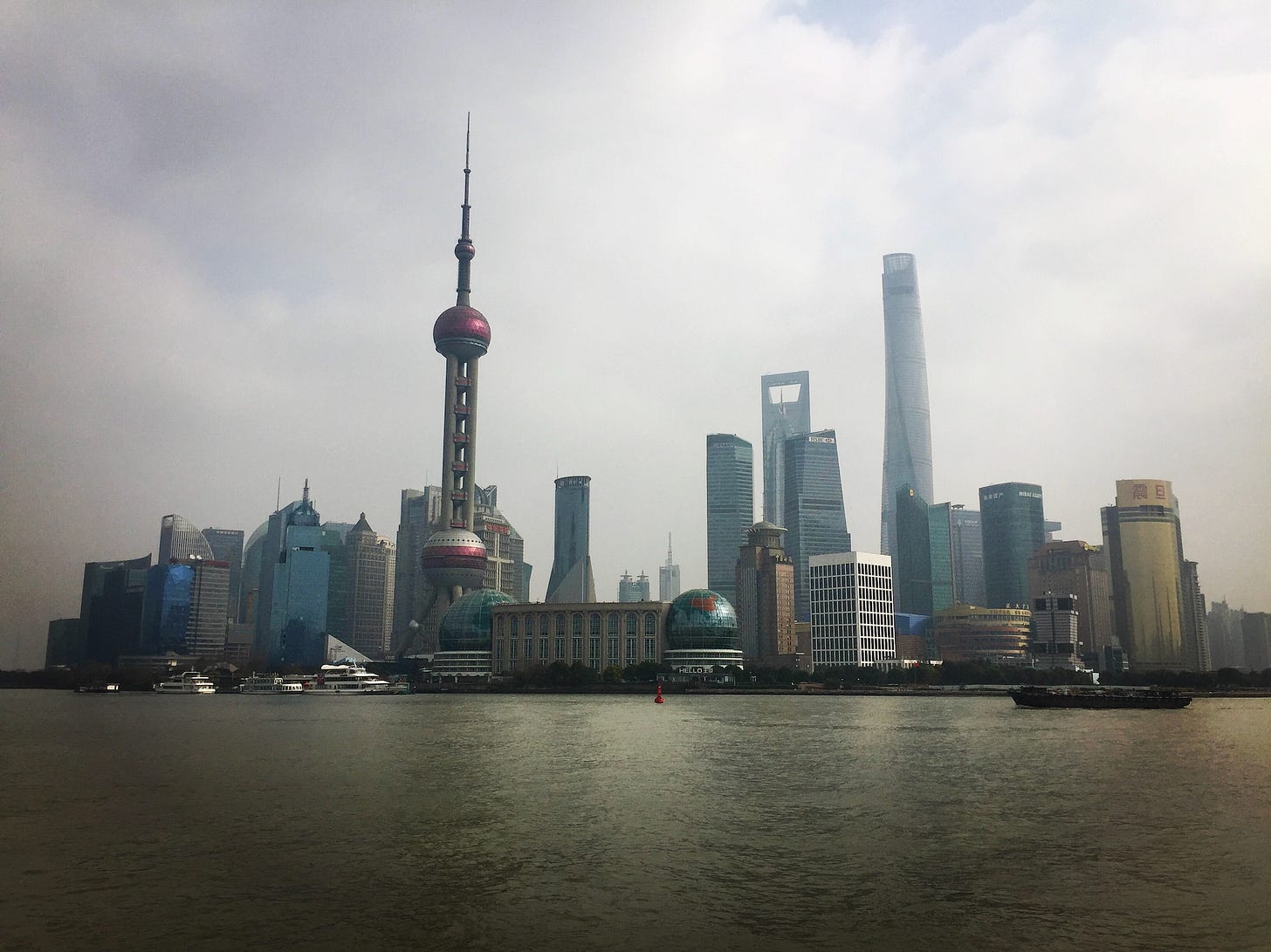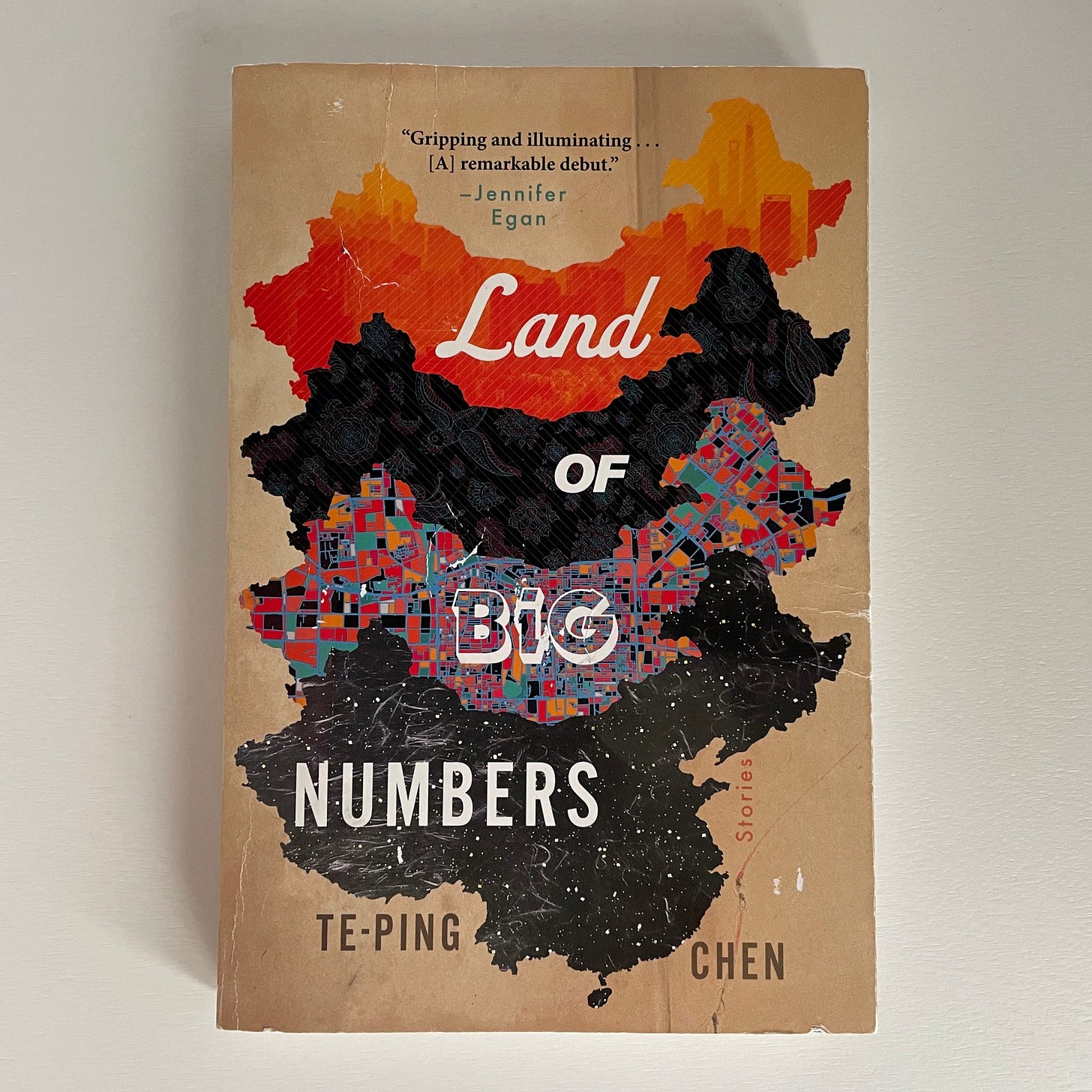I.
Shanghai, Winter 2016
We get hustled almost immediately upon landing. A woman escorts us to a cab, asks for 400 RMB (about $60 USD) for the ride from the airport to the hotel. Tired, ignorant, and foreign, with a small child in tow, we pay it. At the hotel, the cab driver demands another 300 RMB, while the doormen claim the entire ride shouldn’t have cost more than 150. The driver yells at me in Mandarin while my wife keeps our 18-month-old daughter away from it all, over on the sidewalk beneath an ad for luxury watches. Still shouting, the driver repeatedly makes a cross with his index fingers, as if to ward off an evil spirit, to curse me.
We’re staying in Pudong, near the Shanghai Tower. At 632 meters, the Shanghai Tower is the tallest building in China, and the second-tallest in the entire world. Like a snake encased in obsidian, it spirals upward, twisting approximately one degree per floor to offset the effect of typhoon-force winds. Standing near its base, I take a picture of it and the neighboring Jin Mao Tower on my phone. The upper floors of the two buildings are obscured by a thick gray haze that makes it look as though they are burning.
As an American, I can’t help but think of 9/11 when faced with an image like this. I post the picture of the smoking buildings on Instagram, with a caption that reads, Shanghai: serious beauty, serious problems with air quality.
My daughter and I walk the city. Well, I do most of the walking; EJ is strapped to my chest in a baby carrier, the blue foam pad under her butt like the buckle of a B-level superhero belt around my waist. We are in yet another new place, looking for delicious food and interesting architecture, searching out museums and playgrounds and coffee shops while my wife goes to work for a company that makes a very large amount of money. This is our life in Asia and it is a very good one.
We get a lot of stares in Shanghai, far more than we do in Hong Kong, where we have lived for eight months at this point. Eyes linger long on us here. They feel cold, judgmental. There are a few smiles sprinkled in, but not many.
Possible reasons for all the staring:
1. I’m a man and I am the primary caretaker for my daughter. As far as I can tell, there aren’t a lot of what people in the West call “stay-at-home-dads” here.
2. I am white and quite tall. EJ is half-Filipina and quite beautiful.
3. I talk to my daughter, a lot. I narrate the world to EJ, telling her words for the things I know, some of them in Mandarin, the vast majority in English. She repeats back what she can. The other people I see with kids in Shanghai, older women mostly, many of whom are Filipinas, say very little to them. The children they are charged with are eerily silent as well.
4. I sing to my daughter. In response, sometimes EJ likes to do a dance in which she throws her elbows out and wobbles her hips. Her body pivots from side to side against my stomach like a metronome. The poof balls on her winter hat jiggle. Other times she just screams.
5. I am wearing a pink unicorn book bag on my back.
II.
Chicago, Summer 2021
I hear Te-Ping Chen on a podcast called Lit Up. I am painting our front porch brownish-red; she is talking about her new book of short stories set in China, Land of Big Numbers. After listening to her speak of her experience working as a correspondent for The Wall Street Journal in Beijing, and about the challenges of writing fiction set in a country with such intense government surveillance, I sleep once and then bike over to Unabridged Books to buy Land of Big Numbers. It is my first time in a bookstore in well over a year. I am overwhelmed by the amount of people in the store; I am also thrilled to be among books again, and to have such a promising one pinched between my heavily hand-sanitized fingers.
Over the course of the next few days, I read about a twin who immerses himself in professional video gaming while his sister becomes a political activist, a woman who takes calls all day at the Satisfaction Office, a poor farmer who attempts to build a flying machine in order to impress a local member of the Communist Party. I am floored by Chen’s storytelling, the beautiful muscle of her sentences. I am tempted to pull one of these sentences out of context, to show you how wonderfully Chen writes, but it wouldn’t do justice to the collection as a whole; it would be akin to me taking a picture of the Shanghai Tower and acting as though such an image could stand in for an entire city, and the people that move through it.
Our family rents an RV. We drive from Chicago all the way out to the East Coast. I have not yet finished Land of Big Numbers. There is one story left, and I haven’t read it, in part because I’ve been driving an RV across the country, and in part because I don’t want the collection to end. We are at a campsite in Truro, a few miles from the very tip of Cape Cod, when I give in.
It is nighttime. Juni, our 3-year-old, has again become attached to me in her sleeping habits; she won’t fall asleep without me next to her in the less-than-comfortable back bed of the RV. I wait until I hear the heavy breathing that signals her sound sleep, then I use the flashlight on my phone to read the last story of the collection, “Gubeikou Spirit.” It is about a group of people who are trapped on a subway platform for months, waiting for official permission to leave. I am mesmerized. And when I reach the final paragraph, the final line, I just keep reading it. Over and over, while the wind whistles through the trees and our daughter breathes peacefully in the darkness that surrounds us.
Alright, friends, I hope you enjoyed the slightly different style this week; if you didn’t, well, maybe go have a shot of Old Granddad 114 and then read it again.
Before I sign off, I have some news: Ideas Over Drinks is changing. After September, I’m going to take a break from the current cadence of writing here once a week, and will instead be putting out new content about once a month.
Part of why I’m doing this is because I want to bring in more stories and ideas from folks other than me, with the hope of doing more interviews like the one I conducted with the poet Ellen Hagan a little while back. There was bourbon! And great conversation! What else do you need?!
I’m also going to make all of the posts free, as opposed to the current model of offering additional content to subscribers for $5 a month. For any folks who have paid for an annual subscription and still have a few months left on their plan, don’t worry; you’ll be refunded for the portion of the year remaining, depending on when you signed up.
All that being said, while I will be writing this newsletter/blog/cocktail cruise much less frequently—in part because I have another big project on the horizon, which I’ll share more about near the end of the month—I’m not above putting my hat out for tips, for anyone who wants to continue to contribute. I’m still in the process of figuring out the details with Substack; I hope to keep at least the monthly $5 option available for folks who want to pitch in, and if not, I may consider migrating to another platform that better suits my needs. Either way, I’ll keep you posted.
For now, you can help by telling me two things: 1) what kind of amazing people you’d like me to interview in the future at Ideas Over Drinks, and 2) whether you know any such amazing people.
Finally, just a heads up, from this last month of subscriptions in September, we’ll be contributing 20% to the International Rescue Committee, who are sending emergency aid to families upended by the instability in Afghanistan. We appreciate your support.
I’ll be back next week with some cocktail history and a recipe for subscribers.
Until then, salud!
J.





